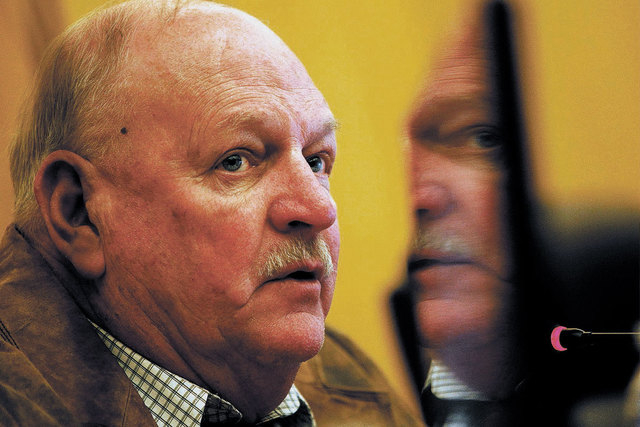Constable Bonaventura fails to report campaign contribution
Las Vegas Township Constable John Bonaventura scored a campaign contribution from a high-profile but secret donor when he ran in the Democratic primary against Clark County Commissioner Mary Beth Scow.
The donor: County Commissioner Tom Collins.
Collins gave a $250 contribution to Bonaventura during the constable’s run for Scow’s commission seat. He made the donation on March 28 by tapping his campaign account, according to Collins’ expense report filed in May with the Nevada secretary of state.
However, Bonaventura didn’t disclose the donation on his campaign contribution reports, which is contrary to the state’s disclosure requirements for candidates running for office. Bonaventura lost to Scow in the June 10 primary.
“It seems pretty clear, absent some explanation we don’t have yet, it should have been reported,” said Scott Gilles, deputy secretary of state for elections, after the Review-Journal inquired about the discrepancy in campaign filings.
Bonaventura’s campaign contribution report filed with the state on May 20 doesn’t disclose the donation. By law, the May reports candidates file are required to list all contributors who gave more than $100 between Jan. 1 and May 16.
Bonaventura didn’t respond to multiple requests for comment. It’s unclear why Collins was omitted from the report.
Bonaventura’s report for that period listed only four contributors who gave $2,905 combined. They were: his wife, Gloria Bonaventura, who donated $1,000; Walter C. Rubyor, who donated $1,000; the constable’s chief deputy, Dean Lauer, who donated $800; and Shane Segal, who donated $105. Bonaventura also received another $3,200 in contributions of $100 or less.
Collins bristled when a reporter asked about the contribution and whether Bonaventura solicited him for a donation.
“That’s none of your (expletive) business, is it?” he said, offering no other comment.
Bonaventura and Collins have other ties besides the campaign gift. The two have appeared to be on friendly terms in recent months, despite Collins voting with all the other commissioners in March 2013 to abolish Bonaventura’s office, effective when his term ends in January.
On April 18, exactly three weeks after donating to Bonaventura’s campaign, Collins signed a sworn affidavit stating that the commission intended to keep Bonaventura from running for re-election and never made an objective finding required by state law that the office is unnecessary.
Bonaventura unsuccessfully attempted to introduce the affidavit in his lawsuit seeking to overturn the County Commission’s March 2013 decision to abolish his office, effective when Bonaventura’s term ends in January 2015.
Commissioners made their decision after a variety of high-profile controversies arose after Bonaventura’s election in 2010. Those included a reality television pilot show with foul-mouthed deputies, financial conflicts with the county and jurisdictional disputes with neighboring constables.
The office handles evictions and serves legal papers with 24 deputies who are sworn law enforcement officers. The office also has eight process servers, and another 13 full-time and part-time county civilian staff who support the operation.
A county district judge determined the affidavit was inadmissible, finding there was improper contact between Collins and Bonaventura’s attorney Robert Pool, who received the document from Collins.
Before the affidavit was signed, Collins and Bonaventura had a recorded telephone conversation that the Review-Journal obtained. In the recording, Collins speaks profanely about his fellow commissioners and encourages Bonaventura in his run against Scow.
In the recording, Bonaventura plays the recorded telephone conversation to someone else and says it’s “pretty funny.”
Bonaventura is now under investigation and police are looking for evidence of illegal wiretapping. The Metropolitan Police Department on June 17 raided the constable’s office and his residence, taking computers, phone and other electronic equipment. Bonaventura hasn’t been arrested or charged with any crimes.
The secretary of state’s office was unaware of the discrepancies in the campaign reports until hearing about it from the Review-Journal.
“We don’t really have the resources to audit the reports, so we don’t have any type of process to go over everybody’s reports,” Gilles said.
Under state law, the secretary of state’s office can impose civil penalties — not jail time — of up to $5,000 for each violation of the state’s campaign finance reporting laws. The law also gives the office the discretion to waive civil penalties based on factors such as the seriousness of the violation, the candidate’s history of violations, and if a violation was unintentional.
In general, the state office’s policy is to contact the candidate, ask for an explanation and give them a chance to tell their side and amend the report if necessary, Gilles said. Candidates typically correct their reports after notification, he said.
Gilles said he anticipates he’ll likely get in touch with Bonaventura about the issue.
Bonaventura also didn’t disclose the donation on his follow-up contribution report, which was submitted June 6 and covered May 17 through June 5 contributions. That report listed no contributions greater than $100 and $1,800 in contributions less than $100.
Contact Ben Botkin at bbotkin@reviewjournal.com or 702-387-2904. Find him on Twitter: @BenBotkin1.


















